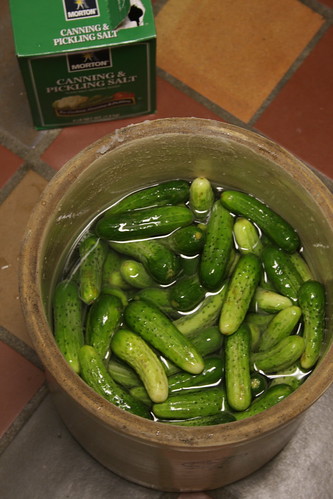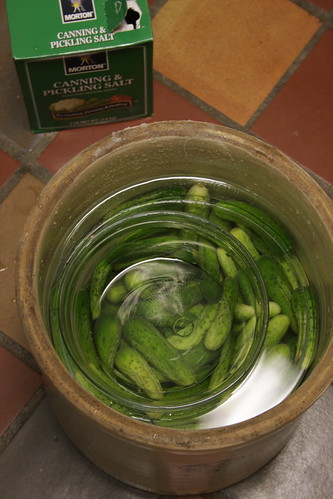and
I am learning so much.

Time to try pickles. In my research I have found that there are many different pickling recipes out there. There are the traditional fermented cucumber in a ten percent brine solution. Then there are the "easy" recipes - basically, cucumbers in a jar with vinegar solutions. There are also the transitional recipes that mix traditional brining fermentation with jarring in vinegar solutions.
I, being most interested in traditional methods, chose to try fermenting/brining. Brining preserves food by anaerobic fermentation, which, by producing lactic acid, achieves the correct pH to destroy toxic bacteria. Sounds fun.
Starting with an antique crock that I recently ran across at an antique store. I paid about $40, which I thought was very reasonably price considering the condition of the glaze (crack free). When I got home and some quick research told me that Love Field Potteries in Dallas, Texas went out of business in 1948. Neat.

Test fitted with a cake pan.
I poured in a gallon of water and placed an egg in it. The egg, as I learned, is an easy measure of salinity - stir in your pickling salt and when the egg floats to the top the ratio is right (do not forget to remove the egg).
Then I put my fresh, washed baby cucumbers and placed a perfect-fitting pyrex baking dish lid on top of the cukes (upside-down to avoid air bubbles) to keep them below the surface. A weight might be needed to help hold them down. I used a bowl with some water in it.
To lid the crock, I used my handled pie dish and then tied it all up in an old flour sack to keep out dust and bugs. I tucked it way away, back in a low linen closet.
The day after I started, I added about a cup of salt to help maintatin the correct salinity.
Every few days I check the cukes for scum. While it forms naturally on the surface of the solution during the process, scum destroys the acidity that you are trying to maintain during the fermentation process and, if left unchecked, results in cucumber spoilage. And we certainly do not want that.
Now, we wait.
jon.


No comments:
Post a Comment